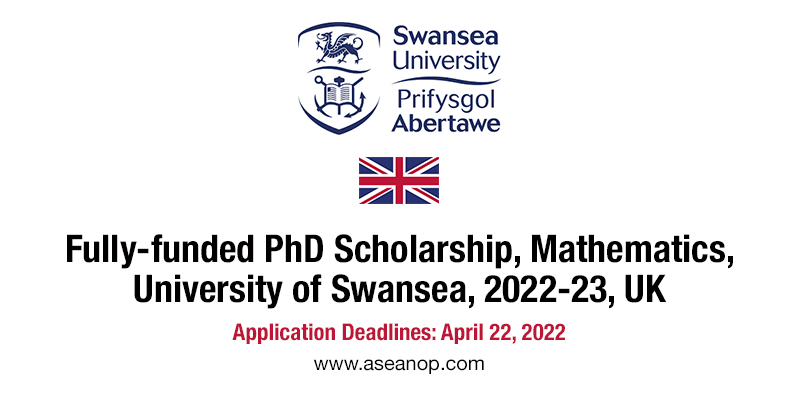Fully-funded PhD Scholarship, Mathematics, University of Swansea, 2022-23, UK

Closing date: 20 April 2022
Key Information
Funding provider: Swansea University and Welsh Government
Subject areas: Mathematical Modelling, Epidemiological Modelling
Project start date:
- 1 July 2022 (Enrolment open from mid-June)
Supervisors: Professor Biagio Lucini, Professor Michael Gravenor, Dr Alma Rahat and Dr Daniel Archambault
Aligned programme of study: PhD in Mathematics
Mode of study: Full-time
Project description:
An emerging challenge for COVID-19 management is how other diseases will respond to long periods of COVID-19 control. Specifically, respiratory syncytial virus (RSV) will normally have infected most children by the age of 2, however this process has been interrupted by social distancing. This may have built up of a large cohort of susceptible children with potential for resurgence. RSV is one of UK’s most common causes of infant hospitalisation, hence there is a need to model the demand on paediatric intensive care units (PICU), alongside ongoing ICU pressure caused by COVID-19.
The project will build a ‘minimum viable model’ for both COVID-19 and RSV (and their interaction). The model will include key interventions (age-structured social distancing and vaccination) and be amenable to analytical mathematical interpretation as well as numerical computations. The goal of the project is to release a mathematically and epidemiologically robust model that will be used by Welsh Government for their planning. Data on RSV surveillance and admissions will be provided by Public Health Wales. Computational resources will be provided by the AccelerateAI supercomputer at Swansea University.
The project will include multi-objective optimisation to investigate intervention trade-offs for the different viruses, and state-of-the-art visualisation to help communication of results to policy makers, aligning with UKRI funded collaborations with Welsh Government.
Eligibility
Candidates must normally hold an undergraduate degree at 2.1 level or master’s degree with a minimum overall grade at ‘Merit’ (or Non-UK equivalent as defined by Swansea University). See – Country-specific Information for European Applicants 2019 and Country-specific Information for International Applicants 2019.
English Language requirements: If applicable – IELTS 6.0 overall (with at least 5.5 in each individual component) or Swansea recognised equivalent. Details on the Swansea University English Language entry policy can be found here.
Due to funding restrictions, this scholarship is open to UK and EU based students only. EU Students must be eligible to receive the EU Transitional Bursary Scheme.
NB: If you are holding a non-UK degree, please see Swansea University degree comparisons to find out if you meet the eligibility.
If you have any questions regarding your academic or fee eligibility based on the above, please email pgrscholarships@swansea.ac.uk with the web-link to the scholarship(s) you are interested in.
Funding
This scholarship covers the full cost of UK tuition fees and an annual stipend of £15,609.
Additional research expenses will also be available.
How to Apply
To apply, please complete your application online with the following information:
- Course choice – please select Mathematics / PhD / Full-time / 3 Year / JulyIn the event you have already applied for the above programme previously, the application system may issue a warning notice and prevent application, in this event, please email pgrscholarships@swansea.ac.uk where staff will be happy to assist you in submitting your application.
- Start year – please select 2022
- Funding (page 8) –
- ‘Are you funding your studies yourself?’ – please select No
- ‘Name of Individual or organisation providing funds for study’ – please enter ‘RS82 – PhD Mathematics’
*It is the responsibility of the applicant to list the above information accurately when applying, please note that applications received without the above information listed will not be considered for the scholarship award.
One application is required per individual Swansea University led research scholarship award; applications cannot be considered listing multiple Swansea University led research scholarship awards.
As part of your online application, you MUST upload the following documents (please do not send these via email):
- CV
- Degree certificates and transcripts (if you are currently studying for a degree, screenshots of your grades to date are sufficient)
- A cover letter discussing the motivations for applying for this project and highlighting the candidate’s experience in mathematical modelling and/or computational mathematics.
- Two references (academic or previous employer) on headed paper or using the Swansea University reference form. Please note that we are not able to accept references received citing private email accounts, e.g. Hotmail. Referees should cite their employment email address for verification of reference.
- Evidence of meeting English Language requirement (if applicable).
- Copy of UK resident visa (if applicable)
For enquiries, please contact Professor Biagio Lucini (b.lucini@swansea.ac.uk).
*External Partner Application Data Sharing – Please not that as part of the scholarship application selection process, application data sharing may occur with external partners outside of the University, when joint/co- funding of a scholarship project is applicable.
Source / More information: Official Website.
